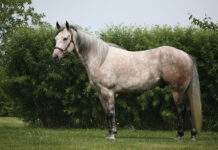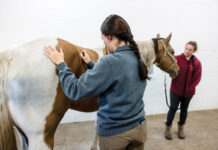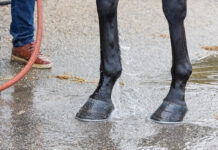

Q: It has been 20 degrees Fahrenheit or colder here for weeks. Is it safe to work my horse in these temperatures, or is it bad for his lungs? Should I scale back or stop riding completely?
A: I don’t mean to belittle your situation, but there are many folks around the country who would consider 20 degrees a “heat wave” and rejoice in the opportunity to work their horses! I know I’ve been riding my horse every day it’s been above 0° F only because less than that and I can’t feel my fingers (I must have really good boots; my toes are NEVER cold!).
Now, I’m mostly working at the walk, interspersed with some brief trot and canter work. Nothing too demanding. And according to Dr. Joyce Harman of Harmany Equine Clinic in Virginia, “there is no temperature where it is too cold for a horse to be ridden or to go outside if they are adapted to it.”
However, I wanted some evidence-based medicine to back us up, since this isn’t the first time I’ve been asked this question. So I went to PubMed to try and find some peer-reviewed, published scientific papers about this topic. Unfortunately most of the papers about the effects of temperature on exercising horses dealt with the opposite extreme—high heat and humidity (remember the ’96 Atlanta Olympics?)
It wasn’t until I typed “equine cold temperature” into their search engine that I uncovered a few studies on the effect of cold air on exercising horses. Turns out that breathing cold air more rapidly and deeply may represent a significant environmental stress to the airways! (keep in mind though, that the experimental protocols often included cantering on a treadmill for 15 minutes or more, something cold-weather riders may not be doing). The mechanism is that at rest, when the body takes in cold, dry air, the upper respiratory tract warms it to body temperature as well as humidifies it before sending it down to the lower respiratory tract. When excessive exercise speeds up and deepens the breaths, the body doesn’t have time to perform this function and the surfaces of the trachea, bronchi, and lungs become cooled and dried.
In addition, exposure of lower airways to cold air alters immunologic responses of horses for at least 48 hours, causing an “upregulation” of inflammatory cytokines and an influx of neutrophils, a type of white blood cells. Researchers also believe that excess heat and water loss from lower airways may stimulate bronchoconstriction immediately after exercise and airway obstruction a few hours after exercise.
With all this knowledge, now riding in cold weather doesn’t seem as attractive. However, keeping your horse moving during winter in the North still has many benefits as long as it’s not “excessive.” Here then is my common sense advice for winter riding, which I think has value for the cardiopulmonary system, the musculoskeletal system, the digestive system and certainly the central nervous system (your horse’s brain!): gently and gradually warm up, take your time cooling down (including drying off if necessary), be aware of the footing if you’re riding outside so that your horse doesn’t slip, and respect your horse’s current fitness level.







It’s the rider or people who hold horses back…but remember to warm that bit. or ride with just a halter and bareback.
Good article.
Winter is nice, but it sure affects some horses!
so ready for summer
cool
Our snow is so deep, only my horse’s ears would stick out if I rode her in the fields.